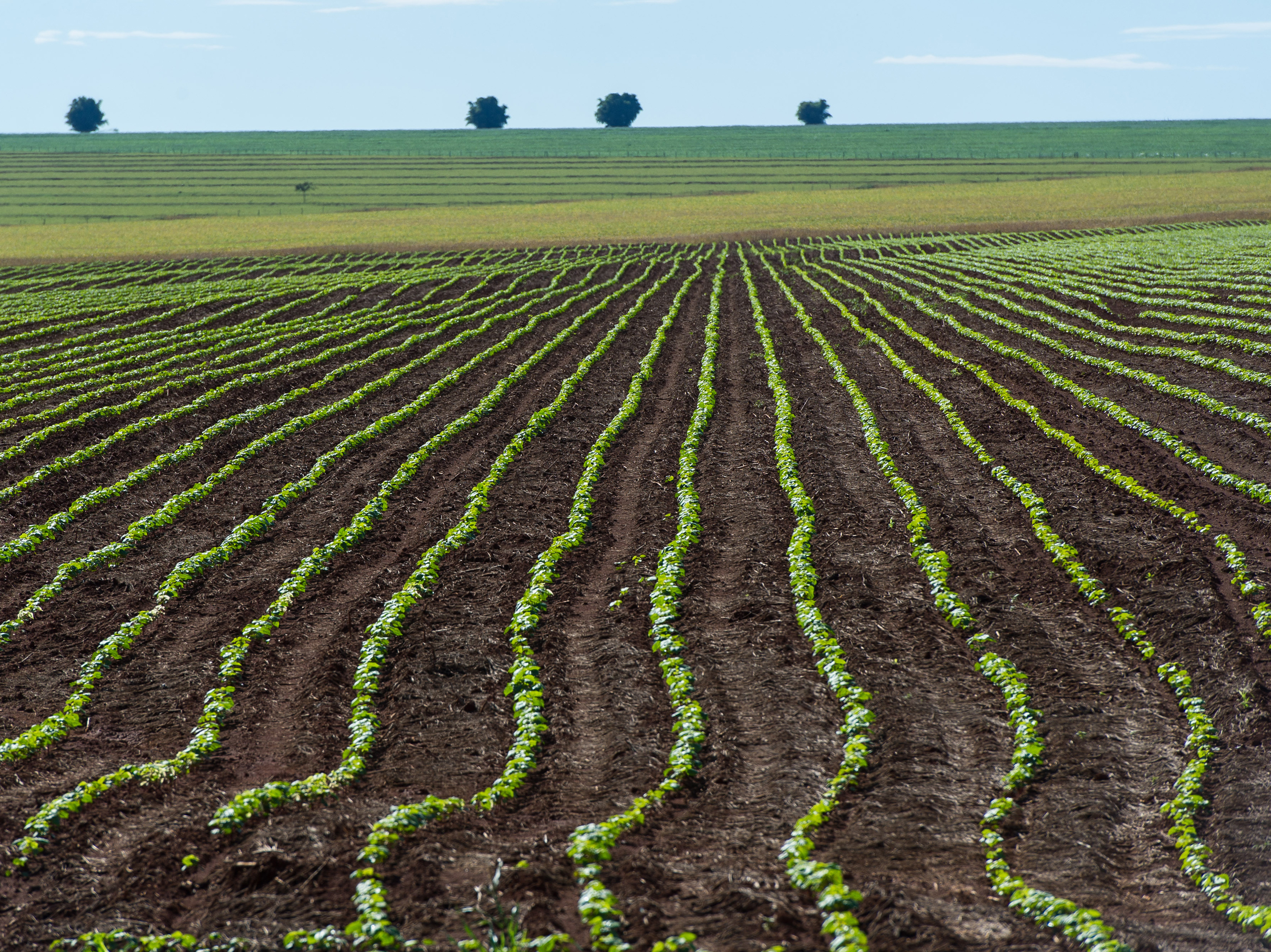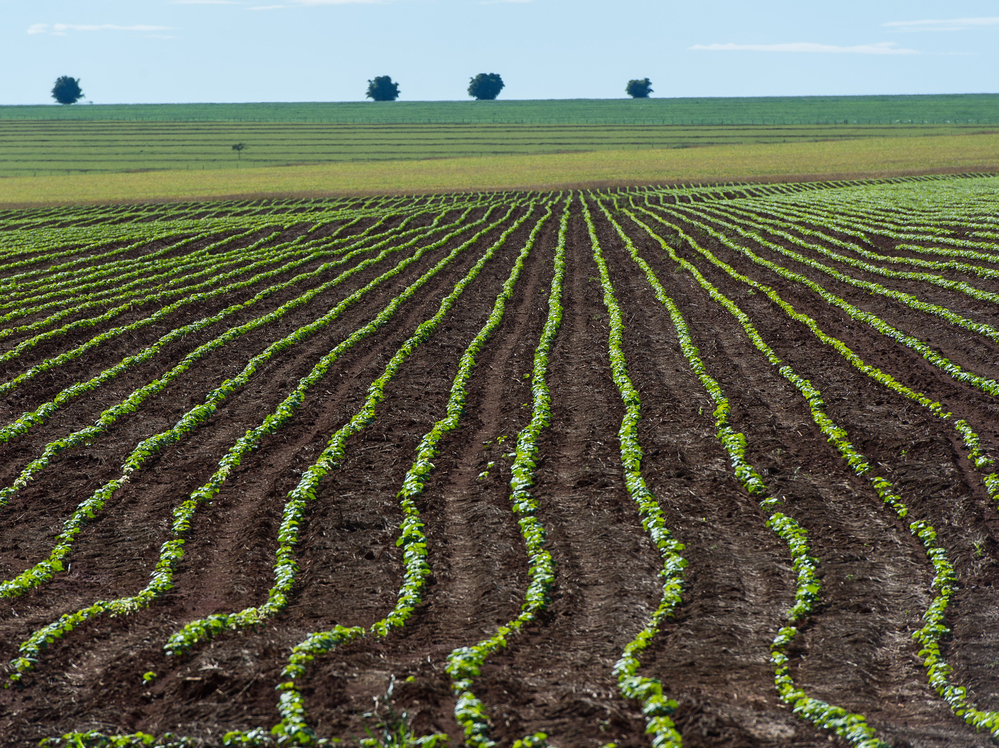 Enlarge picture i
Enlarge picture i A soybean area near Campo Verde in western Brazil in January 2011. Researchers argue that adequate arable land is currently underneath cultivation to feed the planet for the next several decades.

A soybean field near Campo Verde in western Brazil in January 2011. Researchers argue that ample arable land is by now under cultivation to feed the planet for the following several many years.
If you're wanting for a dash of optimism about the long term and who is not, these days? you can come across it in a rosy new prediction about the planet's ability to make foods for the subsequent half-century.
It comes to us from a trio of researchers at Rockefeller University. Their bottom line: We have additional than adequate land to expand all the food that the world's increasing population will wish. In fact, farmers' potential to increase far more food on much less land will even outrun demand for that foods, and farmers will abandon land as soon as used to expand crops.
As the researchers place it, "we are confident that we stand on the peak of cropland use, gazing at a broad expanse of land that will be spared for Nature." Globally, they predict that farmers will release an spot larger than Egypt, or the equivalent of ten Iowas.
Now, just before you go and cross off " food provide " from your listing of factors to be concerned about, I ought to inform you that some other crystal balls present a darker vision of the future. The United Nations' Foods and Agriculture Organization, for instance, thinks that feeding humanity in 2050 will require farmers to grow crops on an additional quarter of a million square miles, or five Iowas. There are even scenarios that present agriculture gobbling up pure ecosystems equal in dimension to the entire U.S.
What creates this kind of wildly distinct visions of the long term ? Basically, it comes down to a handful of critical assumptions about supply and need for food.
The Rockefeller group, for instance, says that demand for meat, and in certain, beef, is not rising as quickly as some have predicted. Chinese are eating additional meat as they get richer, but they are not duplicating the meat- weighty diet plans of numerous other nations.
The single most important assumption, however, issues farmers' ability to improve the volume of food they can develop from just about every acre of land. The Rockefeller University group assumes that farmers will continue to increase their crop yields at roughly the similar pace as they have since 1961 some one. seven percent per yr. Other people, like the FAO and the Global Food Policy Analysis Institute, do not think that is probably. Yield raises have been much lower about one. 2 percent per year over the previous 20 many years. And which is before 1 even considers the impact of the weather change, which could be devastating for some areas.
Jesse Ausubel, who led the Rockefeller group, says that it is "arrogant" and "peculiar" to presume that the world's farmers are not able to increase their productivity swiftly, if needed. Big gains in crop yields haven't been wanted over the previous two decades, he says, due to the fact meals has been fairly abundant.
In simple fact, Ausubel says, the expansion of crop lands strictly for foods production ended twenty years ago extra land was taken, even so, to satisfy the demand for biofuels. But Ausubel expects that expansion to end, too.
Ran Prieur Ran Prieur "The bigger you build the bonfire, the more darkness is revealed." - Terence McKenna James Howard Kunstler: It's Too Late for Solutions Peak Prosperity Author and social critic James Howard Kunstler has been one of the earliest, most direct, and most articulate voices to warn of the consequences -- economic and ... PEAK OIL AND ITS CONSEQUENCES [Editor's Note: I have heard many interviews of experts touting their books on the topic of Peak Oil. I was in complete disagreement with ... Kirstie Alley - Established 1914 - SEE THE CLEARWATER SUN ON JAY ... President Obama Has Given Up Smoking. "I'm fit for duty" Review of Clearwater's Tilted Kilt Pub-Click Here MORMON BATTALION JOURNAL OF LEVI W. HANCOCK Vol. 3 November 24 ... MORMON BATTALION JOURNAL. OF. LEVI W. HANCOCK. Vol. 3. November 24, 1846 to February 6, 1847. These [drawings of the surrounding mountains] was all taken from the ... The future of driving: Seeing the back of the car The Economist ILL love and protect this car until death do us part, says Toad, a 17-year-old loser whose life is briefly transformed by a super fine 1958 Chevy ... Peak Watch If you're squeezed for information, that's when you've got to play it dumb You just say you're out there waiting for the miracle, for the miracle to come Peak oil - Wikipedia, the free encyclopedia Peak oil is the point in time when the maximum rate of petroleum extraction is reached, after which the rate of production is expected to enter terminal decline ... Peak Oil Debunked Peak Oil Debunked Debunking peak oil hype with facts and figures, and exposing the agendas behind peak oil. DISCLAIMER FOR IDIOTS: This site officially ... Has Petroleum Production Peaked, Ending the Era of Easy Oil ... A new analysis concludes that easily extracted oil peaked in 2005, suggesting that dirtier fossil fuels will be burned and energy prices will rise
No comments:
Post a Comment